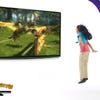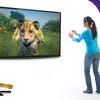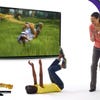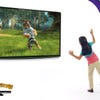David Braben: Taking Kinect to Disneyland
The Elite creator is the controller.
In Disneyland you control the game with voice as well, which is very exciting just from a personal view.
Yes, it's getting better. And what's more is we're getting better at using it. Those two together are really good.
I'm very proud of it. To be honest, the end result, we skewed it a little bit young.
Just because of the nature of it. Having said that, it's still a really nice thing to chill out with, for want of a better word. That's not to say that I'm not very proud of what we did. It's a lovely game.
The trouble is a lot of people have rejected it because of that, because of the way it's making friends with a really cute, lovely animal.
Who knows? I can't possibly comment.
No.
There's a lot we can do with the tech that's subtler. The great thing about Kinect is it's probably the most accurate analogue input device we've ever had.
If you think of the analogue stick for example, if you just show the position of the analogue stick on the screen as a blob, it jitters around all over the place. When we first got analogue controls we thought, oh yes, you can use it like a mouse. But actually, you can't. It's not precise enough. The mouse is pretty precise, but that's only because that's also a relative device.
So the way we tend to use analogue sticks is you're doing it as the direction of movement you're controlling. You're not controlling position. Similarly with the mouse, the wheel underneath has got the phase counter on that tracks the relative position. It's just incremental. So it feels accurate. But actually it's not that accurate. Same with the analogue stick. So, there's a perception of accuracy.
If you use Kinect as a relative control, you've got unbelievable accuracy. It's one of the first things where you can actually use the position directly as a position, not just as a relative movement. That is a change. We haven't come to terms with how best to use that. We're getting better with each stage.
We're barely scraping the surface. What we've not seen, and as a gamer what I'm looking forward to seeing, is where Kinect is used in combination with a controller in ever more creative ways.
What I would love to see is a version of Call of Duty where the controls are exactly as they are today, but you add to it the ability to move my head to look around corners and duck. It's an extra channel of communication. It's an extra analogue stick, if you like. That's very easy.
We'll do it if they don't. This is the interesting thing. I find it quite hard to tell some of the current generation first-person shooters apart. They're all modern guys in combat gear with the same guns – very slightly different control mechanics, but not very.










